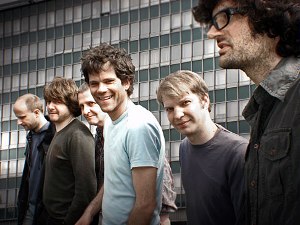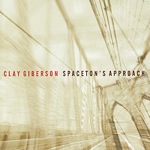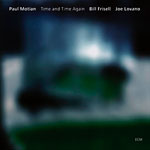Home » Jazz Articles » Interview » Manuel Mengis: Freedom First, History Later
Manuel Mengis: Freedom First, History Later
I don't want to go from A to B to C. I like to go from A to D and back to A, and then to Y, and then to A on the head.
 Jazz is insurmountable. Hundreds of CDs are reviewed by All About Jazz every year, but how many names are recognized? It is endlessly fascinating, yet frustrating—while reveling in the evidence that such a high quantity of music exists, the realization dawns that there aren't enough hours in the day to hear it all. Each name represents an artistic vision, a creative statement, a person or group with something to say, communicating with and through jazz. It's impossible for anyone to do justice to the inspiration, thought and effort that has gone into each record, but together we ought to try.
Jazz is insurmountable. Hundreds of CDs are reviewed by All About Jazz every year, but how many names are recognized? It is endlessly fascinating, yet frustrating—while reveling in the evidence that such a high quantity of music exists, the realization dawns that there aren't enough hours in the day to hear it all. Each name represents an artistic vision, a creative statement, a person or group with something to say, communicating with and through jazz. It's impossible for anyone to do justice to the inspiration, thought and effort that has gone into each record, but together we ought to try. One man who epitomizes the above is Manuel Mengis. A likely unknown to many readers, the Swiss trumpeter is happy to talk in detail about his modus operandi. "It takes me a long time to write music; it's hard work," he says, speaking from his home in Valais, southern Switzerland. "I have a lot of ideas in my mind. In the first few days, I need to find out what I really want—which notes I want to use. I write a lot of stuff, throw some away, edit, and then after a few days I'm really into it—I can get a clearer picture. And sometimes I'm quite fast. But there's no system when I can just sit down and pull the triggers."
Mengis picked up a trumpet after being inspired by traditional night processions in his hometown. "There was a day once every year when we had a big parade with trumpets playing in the middle of the night. My parents would always wake us up at three or four in the morning and we would go to the balcony. You could hear the trumpets coming closer and closer. It was really a special moment. I think that's how I really started to like that sound you could hear from far away, like singing."
Surrounded by classical music as a child, Mengis discovered jazz in his early teens. "An uncle showed me some records and I really liked it right from the beginning. My parents were always very open to different styles of music and art, but the music they had was mostly classical. When I heard jazz, I became more concentrated. I had a classical teacher, but I used to gather some records and try to play along. I had no idea about the theory side of jazz, but I would try to improvise. It was a really different style of playing—more free."
Listening to his two CDs on HatHut records, it becomes apparent that Mengis cherishes musical freedom. He can't give a percentage of how much of his music is scored and how much is improvised, but he says "a lot is written and a lot is not." His band, Gruppe 6, sees the trumpet player joined by alto and tenor saxophones, electric guitar, electric bass and kit drums. This "little big band" format gives Mengis a rich palette of colors. His compositional flair is evident right from the start of Into The Barn (Hatology, 2005). Drummer Lionel Friedli counts off a rumbustious, jarring groove which sends an instant message: this record definitely won't be dinner jazz. A passage of the three horns battling each other over a perilous backbeat follows, but it all snaps into place again for a choreographed chorus after less than a minute, and the tune continues to ebb and flow for another ten.
Indeed, the shortest piece on either four-track album is just under nine minutes, with the rest in double figures. Is this intentional? "No, not at all," Mengis explains, "When I start writing, I have no idea how long the piece will last. The piece just grows. When I write, I find different ways of putting things together, modulating. The first CD had a lot of long tunes. Some people told me they were too long, but I didn't listen to that. I felt like I wanted to continue. I hadn't found out everything about writing long pieces. I didn't want to finish a tune before I felt I had said what I wanted to say. I also think people who are into music are capable of listening to a tune that lasts 15 minutes. It's not pop music—we don't have those limits for airplay and there is a lot of freedom. I like to have that. It takes time; I give it as much time as it needs."
Taking time and encouraging organic development from other band members is a feature of Mengis' writing, as is using the full potential of different voicings in a sextet. He acknowledges that his group possesses a distinct trace of rock influence: "The rhythm section is kind of rock, maybe because that's the kind of music going on right now and I like a lot of rock music too. On the other hand, there are three horns, which I like because there are a lot of possibilities. You can play out harmonies just using the horns, but six people takes a lot of organization. You need to have a good idea of what you want in the end, for example being free. I like that complexity of making music with six people. Also, importantly, I didn't choose people who are involved in the same kind of music. The bassist is from the dub side of things, the saxophones from the jazz side. I like combining different tastes and personalities. With six people, you can achieve a good amount of power as well, which makes it interesting. You have all the possibilities: a huge sound, a tiny sound, two groups playing against each other."
It sounds complicated, both on disc and in the words of the architect. However, Mengis insists that simplicity is at the root of his compositional philosophy. On the question of how he would describe his music to someone who has never heard it, Mengis talks about how "the center is always some kind of theme which is not too complicated, which you can almost sing." But it's more than just theme and variation. "I try to change it—to put it into different colors and rearrange it. I like the metamorphosis of one thing. I try to make counterpoints, to build around it. A lot of parts are written and I like to interchange with more free parts; maybe sometimes it's hard to tell where they end and begin if you don't know.
 The convoluted side lies in how he twists and turns his ideas, viewing and presenting them from a variety of angles. Many of the tunes possess an element of classical complexity—they are structured in movements, sometimes subtly connected and phasing gradually in and out, but often with clearer lines drawn. "For me the music is like a picture or a story. It's not in a specific jazz vocabulary and I like a lot of different atmospheres—maybe one of the most important things is changing the atmosphere and the structure. If I was selling it in a store, I would have a lot of problems putting it in a certain category because it has a little bit of many different influences and sounds."
The convoluted side lies in how he twists and turns his ideas, viewing and presenting them from a variety of angles. Many of the tunes possess an element of classical complexity—they are structured in movements, sometimes subtly connected and phasing gradually in and out, but often with clearer lines drawn. "For me the music is like a picture or a story. It's not in a specific jazz vocabulary and I like a lot of different atmospheres—maybe one of the most important things is changing the atmosphere and the structure. If I was selling it in a store, I would have a lot of problems putting it in a certain category because it has a little bit of many different influences and sounds." It's easy to see why it takes Mengis such a long time to develop finished pieces. But, while the thick streak of rampant unpredictability is a highly enjoyable feature of his music, a shadowy guiding hand becomes increasingly visible on every listen. "I like surprising people, changing many times even within one tune, but I still think there is a red line underneath. It's not just a change—it may be a part of what was there already, but maybe you did not notice it, and then it comes again but more obvious, or at a different speed or with a different surrounding. I like to play with that. I don't want to go from A to B to C. I like to go from A to D and back to A, and then to Y, and then to A on the head. It's more interesting for the writer and, I think, also the listeners—maybe they have to listen to the records more than one time before they see. Sometimes I think there are little parts which are the most important things—bits you don't hear the first time, or even if there are some little solos underneath, you might not notice it's a solo because it is more hidden, more like anticipation."
"Since I'm an autodidact in writing, I developed a language which is my own. I think that makes it a little bit harder, but the good side is that it is more personal. The bad side is that it takes more time. It's based around teaching yourself: I have something in my mind, I write it down, I play it, I listen again, I don't like it, I try and make it better. Writing has a lot to do with taste; it's about my own taste. I like to please my own taste, and not a certain form or structure. Often in the beginning of a tune, what I have in mind is more like an attitude—let's say I want to make a piece which is loud, fast and brutal, or something soft and easy."
Mengis' two albums, Into The Barn and The Pond (Hatology, 2008), were released nearly three years apart—a fact that reflects his carefully considerate approach to making music. In the back-cover blurb for The Pond, Michael Rosenstein declares that this "measured deliberation is something that is all too rare these days." Mengis identifies a slight difference in attitude in the featured material. "I think the first album was more like rough energy and the second was smoother, maybe, more controlled," he states uncertainly. "That band is capable of playing with really high energy, especially live, and I wanted to keep doing that, but try something more controlled. The repertoire is expanding from really controlled stuff to really free blowing. Now, for the next recording, I am trying to make it different again."
Into The Barn was recorded in 2004 and released the next year by HatHut records. Mengis considers himself fortunate to have the backing of Werner X. Uehlinger's renowned independent label. "I made the recording, but I didn't have any contacts with record companies. I sent it out to different people and, after three days, I got the call. It was really very easy! I always thought you had to have connections, that you had no chance if you didn't know people, so it was a very nice thing because I did not believe it was still possible like that. It's funny, because the label is really well known, and I was almost a little bit rude to the guy when he called because he didn't say the name of the company and I didn't realize who it was. I had been very naive, but of course I was really happy. It's great that if he finds something he likes, he will release it, even if it's a person who is not known."
The first CD was very well received, so why did Mengis leave such a long gap until the next one? "I was not ready to just go and do the second one quickly. I didn't want to rush. From the business angle, I don't think it's great to wait very long, but I wasn't ready. We played some gigs, we had a little break, we did other things, played with different people, and then I started to write again and it took its time. Then we had to find time for rehearsals, the studio, and it's two years! It's a long process and I didn't want to make stress for anyone. Also, sometimes it takes a while to be released on the label. For the second CD we made the recording a year in advance and I thought we had moved on by the time it was out, but it's not that important for other people to see immediately. I don't want to appear too serious—it's not like the whole world is waiting for Manuel Mengis! You have to take it easy, and the most important thing is that you move on, even if the documentary is a little bit late."
Logistical difficulties in assembling the sextet played a part in this delay, and Mengis admits past reservations about the size of his group. "It is more difficult to go play gigs and be paid with six people than three people. I had moments when I thought, "Gosh, I'm really stupid! Why do I have such a large band?" but that hard point of making business work was not enough to stop me. I decided to carry on, and I try to write music which is interesting for the others. It's not just a job, because if it was just a job the band would not exist anymore.
"I think about the personalities of the others when I am writing—maybe not only what they like to do, but how they play, and also things I would like them to try, to challenge them. Maybe that is why the group still exists—because, so far, the music has been challenging for them, which they use to find new aspects of themselves. The other side is that we don't hang out together all the time, but when we're on tour or playing it is a chemistry that always works. You don't have to be best friends, but you must have pleasure in working together. I'm really lucky because it's not obvious our situation is like that. Sometimes you have to change the group if chemistry is not working or people want to go in a different direction, but when new things or concerts are happening, the others get organized and it always works." An admirable stance. The music itself is the simplest way to understand why Mengis is so desperate to keep the Gruppe 6 alive: a profound sense of creative cohesion and pure pleasure in spontaneous understanding is there for all to hear.
Switzerland's small size makes it relatively easy for musicians to travel for work, but, as in any country, it's not an easy life. Jazz players have a long history of maintaining second jobs to supplement their incomes, and Mengis is no exception. "My other job is mountain guiding," he explains. "That gives me enough money, because I could not make a living just by playing. Mountaineering and climbing is something very different, maybe also good. I think it helps my perspectives—for my personality and making music, it's good that I have another side that is really different. My job as a guide has aspects I wouldn't want to miss as well, and I'm sure it's better than if I had to play commercial gigs. It gives me a choice, which means I can make the music I really want to. In the best moments, I have a balanced life, but in the worst moments it's a collision of the two worlds, like if I would go to the mountains for three days with a client, come back, and get ready for a gig. But variety is important. I need to have that aspect of nature and being outside, working, using your body, weather in the face and everything!"
This love of the kind of freedom only the great outdoors can provide is clearly reflected in Mengis's music and thinking. The fact that Switzerland lacks any constraint from jazz tradition also plays a major part in his creative opus. In an article entitled "Bloom Time for Jazz from Switzerland" on the HatHut website, critic Tom Gsteiger emphatically describes his country as a "jazz paradise" before toning down this rather hyperbolic opening to construct a reasoned and very well-informed discussion of why its contemporary music scene is in such good health. Drawing potent comparisons with New York cultural policy and the drawbacks of the American jazz "system," he quotes veteran Canadian writer Juan Rodriguez: "The Americans have a big problem with their jazz tradition: how to overcome the immortals? The Swiss don't seem to have those hang-ups. Their music is totally non-derivative and yet based on a very keen study of what came before, they avoid the cliches because they know them."
Manuel Mengis is part of this growing movement. When asked if it is an advantage or disadvantage coming from a country where no one expects jazz to be, he replies: "Yes, I think for me it was a help, because it gave me the freedom I was searching for. I think, even though I'm nodding to jazz music, it's not like there was a tradition I had to adhere to.  I didn't think I had to learn a certain vocabulary—it's not like I had to learn all the standards first, the bebop phrasing and the rest. Jazz for me isn't like that; it doesn't work that way—it's more freedom. There is no American approach; that's not my approach. I was not growing up in New York or Louisiana. I'm not playing the blues because it's not my background. I like to play things which relate to the blues, but I'm not out of that scene. Some people might think that's not an advantage, but it's also some freedom; it depends how you look at it. As I see the music, there's not a distinguished way you have to play, or everybody plays. I was never interested in copying other people or playing a certain way I knew. I always wanted to be a little bit different."
I didn't think I had to learn a certain vocabulary—it's not like I had to learn all the standards first, the bebop phrasing and the rest. Jazz for me isn't like that; it doesn't work that way—it's more freedom. There is no American approach; that's not my approach. I was not growing up in New York or Louisiana. I'm not playing the blues because it's not my background. I like to play things which relate to the blues, but I'm not out of that scene. Some people might think that's not an advantage, but it's also some freedom; it depends how you look at it. As I see the music, there's not a distinguished way you have to play, or everybody plays. I was never interested in copying other people or playing a certain way I knew. I always wanted to be a little bit different."
Furthermore, he wants his music to speak to a wider audience than traditional jazz lovers. "I'm not interested in playing music for people who only listen to jazz. I don't want to talk about things like, "Oh, I hear that phrase, I know that phrase, it's great—Wow, I can play it at tempo 240 and that guy played it on this record the same," or whatever. I'm not interested in that. Maybe if I was from Spain and I loved flamenco, I would play that all my life, but here the situation is more about different influences."
"I hope my music can appeal to a lot of different people, especially in its live concept. The most important thing when I play music is the live situation, and using that I can reach people. I've already had people coming up after concerts saying, "I never listen to jazz—I normally listen to rock—but I really liked it!" There are some parts of that attitude in it. If people see it live, they can understand what's going on. It's less abstract. I'm not really interested in making music just for nerds, if you see what I mean. There are jazz nerds and there are jazz people, but I want to make music for people who are able to listen to music. Some of them like it and some of them don't, and that is also important. You can't just play music that is nice for everybody."
Gsteiger's article also slams the stereotypical view of Swiss folk culture in the eyes of the world, citing one review of Into The Barn which refers to "fears of cowbell and lederhosen music." Mengis also isn't keen on this misleading, jaded perspective: "There is a stereotype that some people may still have, but Switzerland isn't just the lederhosen thing. Like all other countries, we are connected to the whole world. We have a big classical scene, a rock scene, a pop scene. The folklore thing is different anyway—the old folk music is really very interesting. People in the North and South had their own styles. Then there was a famous guy who started the kitsch folklorey thing which really sold with tourists. You have a lot of that going on, but on the other side you have a big scene that is making all different kinds of music. I mean, it's not obvious, for example, for a Swiss guy to have a reggae band, but there is a reggae scene. It's not big, but you find all different styles."
So, to the future. Where does Mengis think jazz is going? "It's a big question, which I hope I can't answer. That would be my preferred view of the jazz scene—not being able to predict what will happen. I think at the moment, a lot of people are starting to write for larger ensembles, with more distinguished stuff, but on the other side there is this kind of punk jazz attitude developing and a mainstream, traditional scene which is also really strong. I think it's going more and more into very diverse styles and, even in five years, it will be much harder for people to label something as jazz, rock, ethno music, contemporary music.
"The genre and label thing is very difficult, especially if you make music which isn't obviously of a certain kind. Some people call my music jazz-rock, but that kind of 'fusion' in the traditional sense was going on 30 years ago and I'm not really doing the same thing. But, in the end, if you talk to people, you need to have terms. Even if they are not ideal, terms can help people to see what you mean. Maybe we will have to find 25 to 30 names for different kinds of jazz music."
People often make comparisons as a form of shorthand for talking about music they are struggling to describe, looking for security by linking the unfamiliar to something they know. Mengis' work is no exception. "Some people say my music sounds like it was influenced by Frank Zappa, and I say 'Thanks, that's really interesting, but I've never really listened to him!' And being compared to Mingus is a huge compliment! I have listened to him, but not all the time. It's weird when you are compared to people you don't know very well yourself. I never had one person I was really fixed on. I don't think there was any one thing which really changed my views, more like maybe 30 people who changed little parts of my hearing."
For the next album, Mengis plans to break with one of his own standards. "I'm fed up of writing long tunes. It's time to change. I was not at that point before, but now I am going through a change of writing style. We had a change of saxophonist for the second CD, and now we also have a new alto player, so the group is evolving as well. Hopefully it will come out in 2009, and I hope we will play a few gigs as well. People still don't know my name, even though I've had some good reviews. It takes a lot of time, a bit of luck, and some people spreading the word."  The end goal, Mengis states, is a situation when "the written part is just the foundation and everything can be improvised," but he acknowledges that it is "hard to achieve," saying, "I want to achieve a creative high point. When I'm playing music with other people, there are moments where it becomes more like a spoken phrase—it becomes a bit like magic, not in a corny way. Sometimes you really have moments like that—you forget what's going on, everyone plays together and there's a certain energy. Maybe the goal is to try and achieve that more and more. That's why everybody does the things they like—a racing driver or anyone—they love getting really into it, being highly concentrated and feeling like they're on a different level."
The end goal, Mengis states, is a situation when "the written part is just the foundation and everything can be improvised," but he acknowledges that it is "hard to achieve," saying, "I want to achieve a creative high point. When I'm playing music with other people, there are moments where it becomes more like a spoken phrase—it becomes a bit like magic, not in a corny way. Sometimes you really have moments like that—you forget what's going on, everyone plays together and there's a certain energy. Maybe the goal is to try and achieve that more and more. That's why everybody does the things they like—a racing driver or anyone—they love getting really into it, being highly concentrated and feeling like they're on a different level."
The freedom about jazz which attracted him as a child has now become deeply imprinted on Mengis's character. His idiom has been shaped by love of nature, the artistic liberty of coming from a country with no musical preconceptions and a desire for creative fulfillment. He has found the ideal balance of being informed, rather than inhibited, by tradition. "At the end, written down or not, jazz, rock, or whatever—who cares—it has to do about the attitude you have while playing, about being sincere and authentic, to use imagination. In the best moments you can achieve that." Yet the trumpeter worries that "maybe I was not really concrete in the answers." In fact, that was one of the most concrete statements he made. No matter. As in his music, he is constantly asking questions of himself and others, using his freedom to the fullest possible extent and letting his mind take him wherever it wants to go.
Selected Discography
Manuel Mengis Gruppe 6, The Pond (Hatology, 2008)
Manuel Mengis Gruppe 6, Into The Barn (Hatology, 2005)
Photo Credits
Top Photo: Stefan Postius
Bottom Photo: Courtesy of Manuel Mengis
Tags
PREVIOUS / NEXT
Support All About Jazz
 All About Jazz has been a pillar of jazz since 1995, championing it as an art form and, more importantly, supporting the musicians who make it. Our enduring commitment has made "AAJ" one of the most culturally important websites of its kind, read by hundreds of thousands of fans, musicians and industry figures every month.
All About Jazz has been a pillar of jazz since 1995, championing it as an art form and, more importantly, supporting the musicians who make it. Our enduring commitment has made "AAJ" one of the most culturally important websites of its kind, read by hundreds of thousands of fans, musicians and industry figures every month.




















